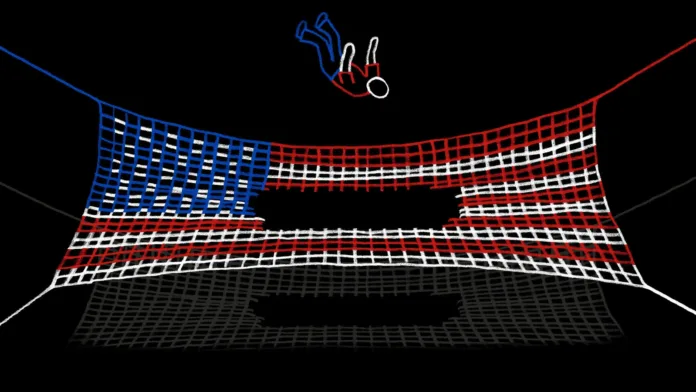The United States, which once played a key role in ending World War I and building the League of Nations with the 14-point Declaration of the then-President Woodrow Wilson, and basically, with the spread of power and the establishment of international institutions, he had established a new order, in recent years began to weaken and destroy it, and by giving originality to hard power on the world stage, has abandoned the fundamental American values globally that were the source of the main power of the United States.
The United States gained everything in the bipolar atmosphere of the Cold War after the collapse of the Soviet Union, along with its cultural, social, and economic values; and with the creation of global opportunities, it has been losing the essential role of the United States in leading the world for years.
Contrary to some American theorists who believe that the “American Century” and its global leadership are not over and China still has a long way to go to overtake the United States, but it seems that the erosion of infrastructure and The financial inability to repair it has not only discouraged the staggering costs and investments made in various parts of the United States over the years, but has also fueled the inefficiency of US governments and ultimately ushered in an era of economic and political decline. Provided the United States cultural and even military. The United States is now slowly losing its tools and capabilities in the area of soft and hard power to influence others and achieve its goals.
The United States, which began to use the soft and hard aspects of its power continuously after the end of World War II, was able to use these tools to advance with coups and the permanent deployment of its military forces in Europe and the Middle East until two decades ago. But over the past decade, the United States has taken an incredible turn to weaken its European allies in support of right-wing European groups and governments, deepening the gap in trans-Atlantic relations by reinforcing the extreme nationalism that led to events such as the Brexit.
During the same period, China was able to use its disruption and vacuum to promote its Confucian values through economic growth and cultural influence through the establishment and expansion of its educational institutions around the world. The United States, on the other hand, has added to its problems by reacting to China’s increasing cultural mobility, fearing that its cultural attractions will diminish by taking negative steps such as leaving UNESCO and the UN Commission on Human Rights and closing some cultural institutions.
Plunging the United States into a strategic dilemma that coincided with the rise of major world powers in East Asia and Europe; As well as the numerous crises in the Middle East that plunged American power into the mire of fruitless and costly wars, destroyed six decades of the success of the carrot and carrot policy and thwarted its strategic effectiveness and appeal.
China’s economic strength and growth in recent years, and its support for non-aligned political currents, have allowed Beijing to turn its economic power into a political advantage and use it to indirectly challenge the United States. As a silent power, China increases its share of the US-led world order and enhances its global standing. In other words, the People’s Republic of China, relying on its centralized and integrated structure and national support, has been able to experience significant economic growth and gain regional and global credit by increasing GDP. By gaining such credibility, China has been able to advance its political and even security goals by establishing regional economic organizations and alliances. Beijing has been able to elevate its position and undermine the US undisputed leadership in global governance by ignoring the United States in the order in which it was founded.
Transatlantic relations also suffered a major blow during the Trump era, leading to the secession of Britain, a strategic ally of the United States and a strategic partner of the European Union, from both the United States and the European Union. The Biden administration now has to pay the cost of returning to transatlantic relations and making up for lost trust with the European Union by agreeing to a German-Russian gas project called Rolling Stream 2 and shortening a NATO summit on a 2.5-percent share of GDP. The domestic countries pay for the right to defense. In these astonishing developments, Europe today is one step closer to political independence from the United States, and will no longer be a slave or strategic ally of the United States, as it has been for the past seven decades, and will see itself more as a strategic ally.
Russia also rebuilt its military in the political turmoil of the Trump era and, by testing strategic weapons and missiles, forced Biden to hold comprehensive talks with Russia on “strategic stability”; that the United States got out of under Trump’s time to agree.
Thus, the new situation in China, Russia and Europe will put a lot of pressures on the United States, and, consequently, weaken the position of the United States as a hegemon capable of drawing and enforcing the rules and organizing the international system. Reclaiming this position will not be possible for the United States due to the presence of global challenging powers such as China and Russia, as well as Iran as another regional challenger.
In fact, the United States, with its extreme unilateralism in pursuing tough strategies that lead to invasions of Iraq, Afghanistan, Libya, and indirect involvement in the Syria-Yemen war, and the use of sanctions that have hurt the US economy the most, unilaterally versus its own multilateral order. For many years he had worked and spent to create and maintain it, he stood up and weakened his position painfully.
In the Trump era or US strategic confusion, China took advantage of the situation, relying on its clear history as a non-colonial power, and taking advantage of national power and internal unity led by a one-party system and astronomical foreign exchange reserves. Approximately,$ 4 trillion has been able to become an unpleasant contender for American authority and leadership just by upgrading and consolidating its position in the international arena. China, which grew up in the artificial womb of the United States with the economic plans of the White House and the CIA, ousted the US global leadership and authority from the United States without firing a shot during its puberty with still silent shrewdness.
The domestic situation in the United States is also unfavorable. In fact, the Biden administration’s concerns are not just with China, but with widespread domestic change and the fragmentation of American society. Deep racial divisions between black and Latino minorities and whites, gender discrimination, rising crime, especially among adolescents, and growing American citizens’ distrust of official institutions, and in particular a 40-percent decline in public trust in the coronation system during the coronavirus. It has also severely weakened the United States as a major source of power.
This internal social gap is widening due to weak economic and social management and an over-focus on foreign interventionist policies. In other words, it can be said that the values that the United States claimed to spread in the world have disappeared from the American society and have weakened the American foreign power by creating a vicious cycle.
On the other hand, the wrong decisions of various governments and the proximity of the United States to dictatorial and authoritarian regimes have practically lost their moral authority to criticize inconsistent authoritarian systems of government. Under such circumstances, the United States has severely lost its ability to build internal and external consensus, and its traditional allies such as France and Germany can no longer persuade public opinion to side with it. In this regard, US efforts to polarize the conflict with China under the dual title of the evil communist empire and the free liberal world have failed to reach a consensus among Western countries.
In contrast to the United States, China, by avoiding militarism and interfering in the internal affairs of countries, as well as flexibility in economic cooperation with different political systems, has been able to replace the United States in regional alliances and by creating regional trade agreements such as ARSP It includes America’s allies, such as Japan, to show off its leadership skills to a large extent. It is noteworthy that since China never wants to change the world order and benefits from the existing order, many countries are willing to cooperate with this country and want to use the Chinese market and its cheap labor.
Now, in addition to the absolute decline that it is facing domestically and socially and demographically, the United States is now experiencing a sharp decline globally, allowing China or Europe to enter into trans-regional alliances with other allies and to put an end to its historical superiority.



